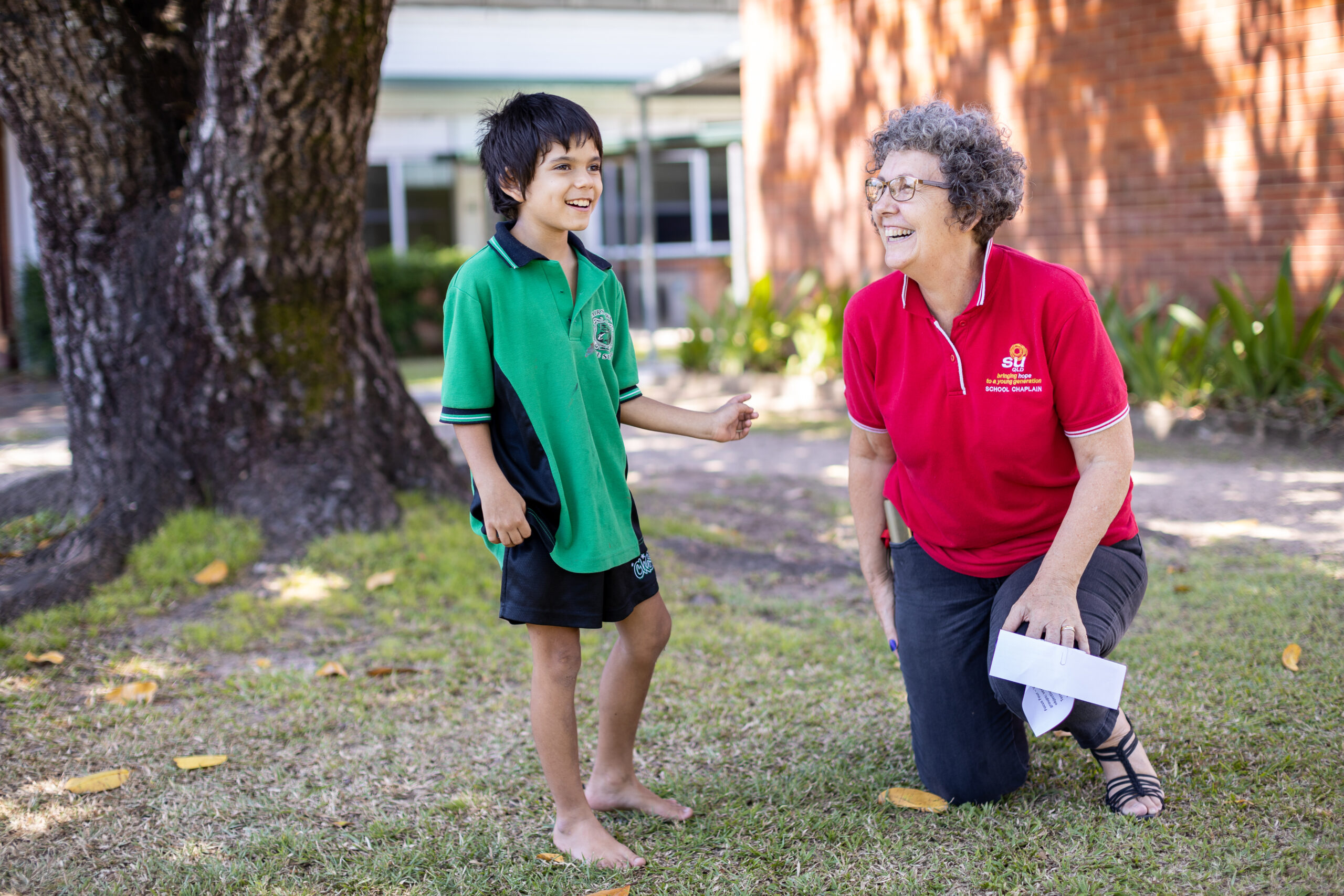Your support for the ‘one’ is changing the lives of many
In a crowd, it’s easy to miss that little person sitting alone, who doesn’t feel they have a place. Because of your support for school chaplaincy, this isn’t the case at Cairns West State School.
Working at a school with a high percentage of students from backgrounds that include complex intergenerational trauma, Chappy Billie is always looking out for ‘the one’. And some days, there are lots of ‘ones’.
On a daily basis, she’s surrounded by families who have survived the Ebola virus, plague, genocide and the effects of disease and malnutrition in refugee camps.* The need is huge.
Chappy Billie never knows what awaits her when she walks through the school gates each morning.
But thanks to the flexibility of her role, she is able to stop, turn around, and change direction to meet those needs.
Deputy Principal of Student Engagement, Cathy Nixon is passionate about student wellbeing, and is grateful for the extra layer of support chaplaincy brings.
“Everyone adores Chappy Billie. She’s so flexible and almost feels like an aunty or big sister to the staff team,” says Deputy Cathy.
“At our school, we are privileged to get a number of students newly arrived to Australia, coming directly from refugee camps in Asia and Africa. This is an area we are very blessed to have Chappy Billie working in, because we know that the impact of our chappies can be life changing.”
“If you can imagine, these students are arriving at a strange school, in a strange culture, and Chappy Billie plays a really important role. She runs school lunchtime programs involving art and therapeutic conversation, and the popularity is incredible.”
A chaplain has the unique opportunity to nurture and grow a community, all simply by caring for ‘the one’.
 Chappy Billie has a heart for young people, and many years of experience in pastoral care. She’s especially grateful for her faith, which sustains her, and for her training, which gives her confidence to support young people from traumatic backgrounds.
“When a young person comes from a background of trauma, they are often hypervigilant and can behave unpredictably,” explains Chappy Billie.
“Sometimes a young person might have an unexpected reaction to something, and our training gives us language to communicate to our colleagues or other workers about what is going on.”
“Training makes you confident in what you’re doing. You have an understanding around discretion and code of practice, and how to properly support people.”
If you or someone you know has an interest in pursuing a career in youth work or chaplaincy, find out how you can be equipped through SU Australia’s Institute of Training (RTO 30548). Visit suit.org.au to find out more.
*Extract from a series to highlight the impact of Indigenous Education in Queensland schools.
**This story was originally published in 2021 so certain details may have changed.
To further this work in your local area, follow the links below.
Chappy Billie has a heart for young people, and many years of experience in pastoral care. She’s especially grateful for her faith, which sustains her, and for her training, which gives her confidence to support young people from traumatic backgrounds.
“When a young person comes from a background of trauma, they are often hypervigilant and can behave unpredictably,” explains Chappy Billie.
“Sometimes a young person might have an unexpected reaction to something, and our training gives us language to communicate to our colleagues or other workers about what is going on.”
“Training makes you confident in what you’re doing. You have an understanding around discretion and code of practice, and how to properly support people.”
If you or someone you know has an interest in pursuing a career in youth work or chaplaincy, find out how you can be equipped through SU Australia’s Institute of Training (RTO 30548). Visit suit.org.au to find out more.
*Extract from a series to highlight the impact of Indigenous Education in Queensland schools.
**This story was originally published in 2021 so certain details may have changed.
To further this work in your local area, follow the links below.
 Chappy Billie has a heart for young people, and many years of experience in pastoral care. She’s especially grateful for her faith, which sustains her, and for her training, which gives her confidence to support young people from traumatic backgrounds.
“When a young person comes from a background of trauma, they are often hypervigilant and can behave unpredictably,” explains Chappy Billie.
“Sometimes a young person might have an unexpected reaction to something, and our training gives us language to communicate to our colleagues or other workers about what is going on.”
“Training makes you confident in what you’re doing. You have an understanding around discretion and code of practice, and how to properly support people.”
If you or someone you know has an interest in pursuing a career in youth work or chaplaincy, find out how you can be equipped through SU Australia’s Institute of Training (RTO 30548). Visit suit.org.au to find out more.
*Extract from a series to highlight the impact of Indigenous Education in Queensland schools.
**This story was originally published in 2021 so certain details may have changed.
To further this work in your local area, follow the links below.
Chappy Billie has a heart for young people, and many years of experience in pastoral care. She’s especially grateful for her faith, which sustains her, and for her training, which gives her confidence to support young people from traumatic backgrounds.
“When a young person comes from a background of trauma, they are often hypervigilant and can behave unpredictably,” explains Chappy Billie.
“Sometimes a young person might have an unexpected reaction to something, and our training gives us language to communicate to our colleagues or other workers about what is going on.”
“Training makes you confident in what you’re doing. You have an understanding around discretion and code of practice, and how to properly support people.”
If you or someone you know has an interest in pursuing a career in youth work or chaplaincy, find out how you can be equipped through SU Australia’s Institute of Training (RTO 30548). Visit suit.org.au to find out more.
*Extract from a series to highlight the impact of Indigenous Education in Queensland schools.
**This story was originally published in 2021 so certain details may have changed.
To further this work in your local area, follow the links below.
260/335

